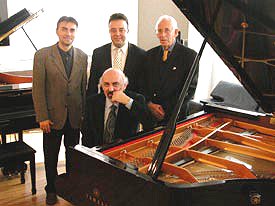Sydney International Piano Competition Selects Yamaha
BUENA PARK, CA (July 23, 2004) Mention Australia and visions may arise of untamed kangaroos, soaring boomerangs and, in the musical sphere, forest-grown didjeridus the handcrafted wooden pipes blown by Aboriginals to produce a wild, eerie drone. Yet, Australia's rich, diverse culture also produced Percy Grainger, the brilliant twentieth-century pianist and composer, and since 1977 the continent has hosted the elegant and prestigious Sydney International Piano Competition. |
This year marks the eighth outing for this competition, which held live auditions around the world to select a total of thirty-six applicants. Yamaha provided the audition facilities in Paris, New York and Tokyo.
Describing the audition experience in New York, Artistic Director and Jury Chairman Warren Thomson exclaims, "The staff at Yamaha was a wonderful support to the competitors, who came from many parts of the United States and Canada. At Yamaha Artist Services, Inc., we were provided with a large selection room, a CFIIIS concert grand piano, a warm-up room for competitors and a technician to keep the piano in top condition." The warm-up room featured the Yamaha MIDIPiano® MPC2 with headphones, insuring that no sound would escape to disturb the auditions being performed. "In each city," continues Thomson, "there was a panel of three judges, including myself. In New York, I was joined by Lev Natocheny, who is currently a professor at the Frankfurt Hochschule in Germany, and Phillip Kawin of the Manhattan School of Music. The New York auditions were the largest in number each of the fifty-three candidates performed for thirty minutes and lasted five days. Competitors studying in the U.S. came from many countries, including Taiwan, China, the Philippines, Russia, Australia, South Korea, England, Georgia, Canada, Lithuania, Poland and Spain. Yamaha provided an ideal environment, allowing each competitor to show how well they could perform a range of different styles". Kawin was equally impressed. "It was a pleasure to hear such a fine level of playing," he explains. "And the people at Yamaha were so hospitable and generous. We were looking for creativity, personality and more than mere technical proficiency we wanted pianists with a grasp of style, artists who have something to say. We also sought a certain quality of sound an ability to sing, to project without forcing. The Yamaha technicians were there at a moment's notice to keep the instruments in top form, which was crucial. They could not have been more helpful." "For the competition overall," adds Thomson, "Yamaha's support was one of the vital elements in our success." For more information, write Yamaha Corporation of America, Piano Division, P.O. Box 6600, Buena Park, CA 90622-6600; telephone (714) 522-9011; or e-mail infostation@yamaha.com. |
 |
| © 2010 Yamaha Corporation of America. All rights reserved. |

